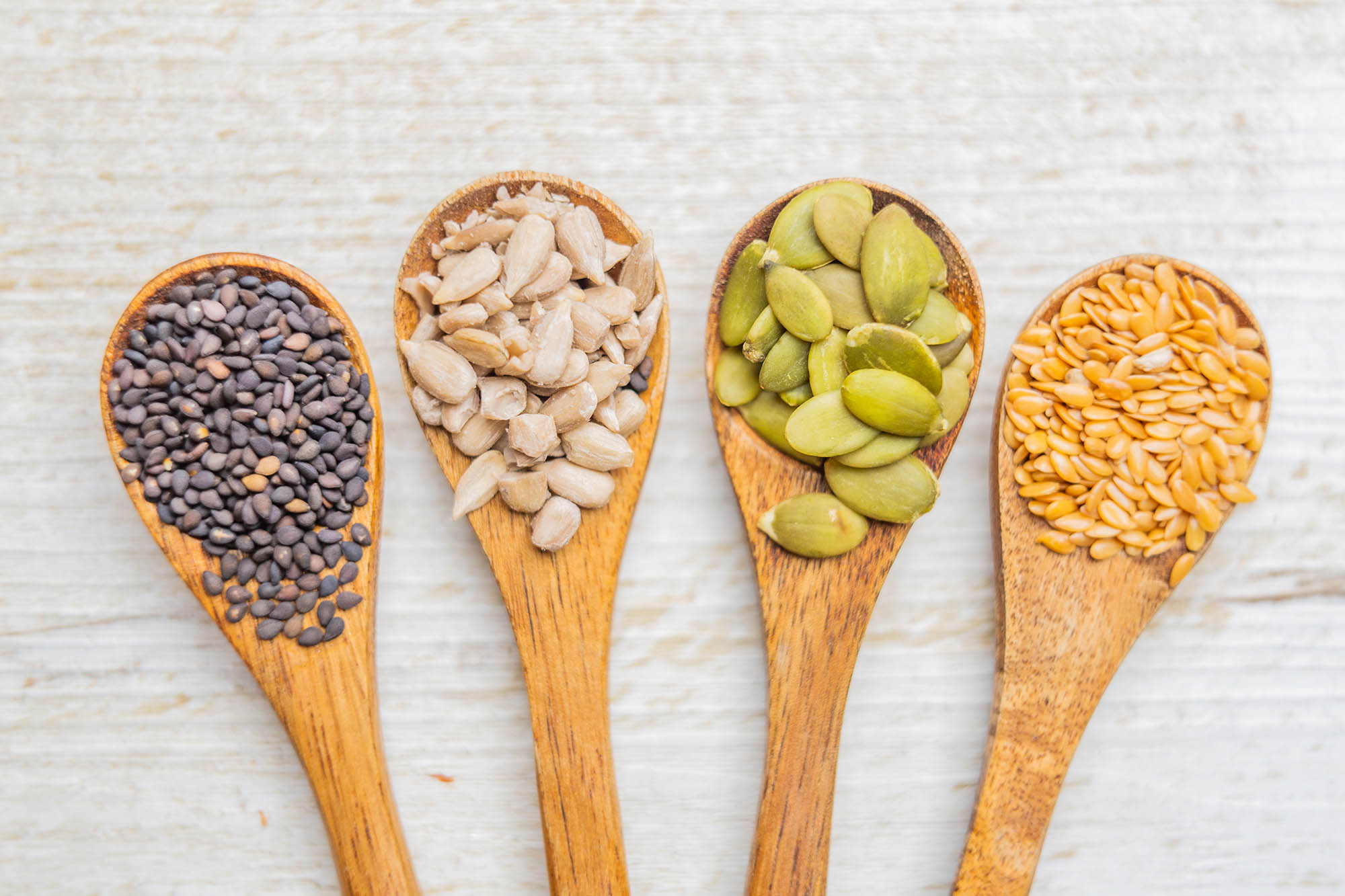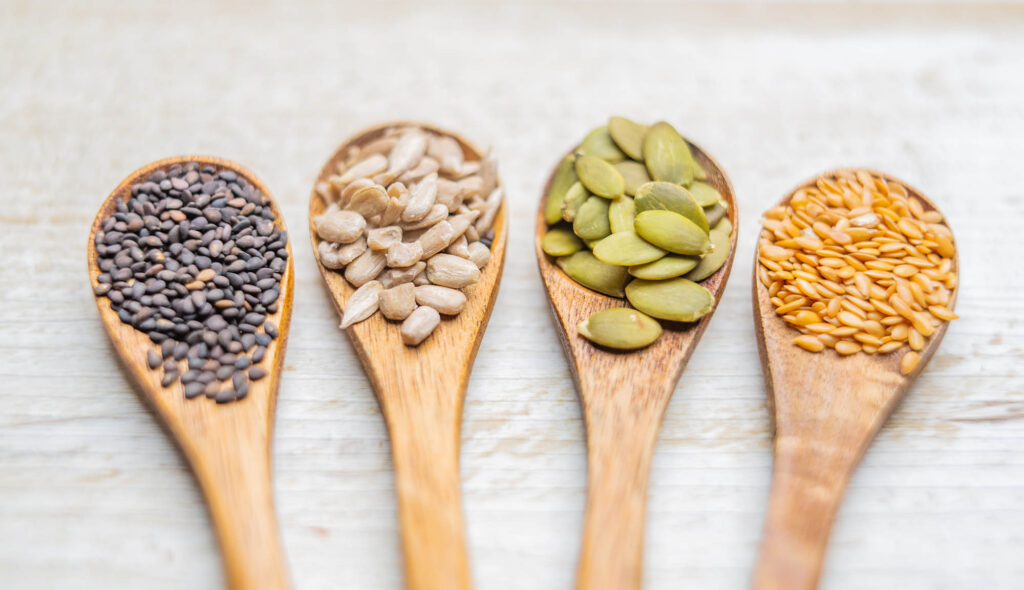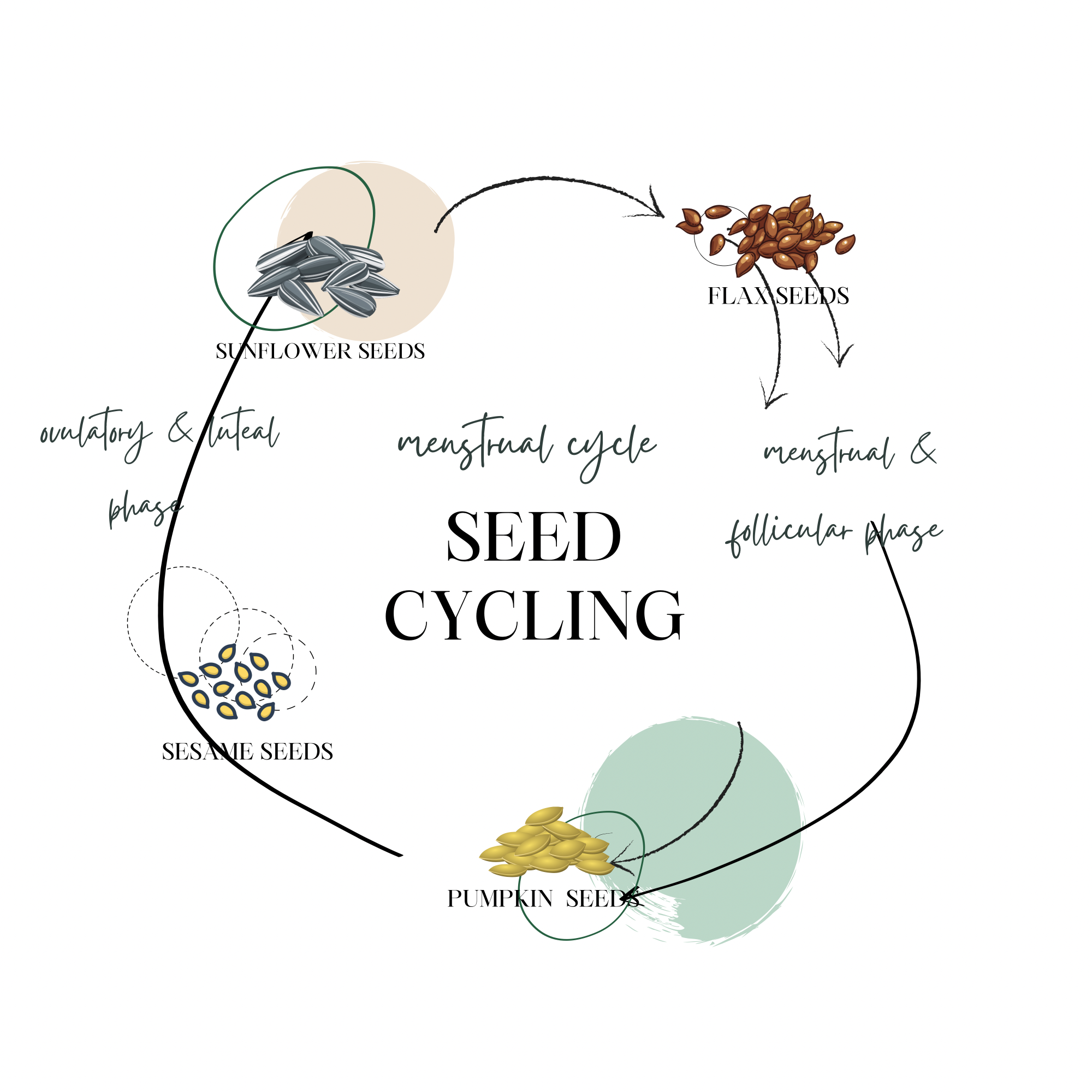I wouldn’t be a hormone health food blogger if I didn’t write an article on seed cycling. Seed cycling is very popular in the hormone space, but there are still many women that reach out to me asking to clarify what seed cycling is.
What is seed cycling?
Seed cycling is the practice of rotating different plant seeds along with the different phases of the menstrual cycle. There are four seeds used in seed cycling: flax seeds, pumpkin seeds, sesame seeds and sunflower seeds. Flax seeds and pumpkin seeds are used in the menstrual and follicular parts of the cycle and sesame seeds and sunflower seeds are used in the ovulatory and luteal parts of the menstrual cycle. The general recommendation is the consumption of 1 tablespoon of each of the ground seeds per day ( 2 TBSP in total daily).
The claim with seed cycling is that each seed has a specific nutrient profile that supports the production of hormones at the given part of the menstrual cycle and can therefore help to balance hormones and regulate the menstrual cycle.

Does seed cycling work?
Many women claim that they can achieve wonderful results in balancing their hormones with seed cycling. It is true that we have evidence that nutrients are utilised differently at different parts of the menstrual cycle eg, zinc, magnesium and calcium (1) (2). It is also true that seeds contain an impressive array of specific nutrients that can be helpful for hormone production and hormone balance. Flax seeds, in particular, have been most widely studied and have been found to be very helpful in treating many hormonal related problems for women that are menstruating and also for women that are menopausal. Flax seeds have high fibre content and high phytoestrogen content which helps to both lower and increases estrogen in the body depending on what the body needs. They are especially helpful in helping in issues of estrogen dominance and are considered first-line treatment for heavy painful periods as well as breast pain (3)(4). Studies have shown that eating flax seeds can increase luteal phase length and reduce the number of anovulatory cycles, as well as improving progesterone to estrogen ratio in the luteal phase, effectively helping to boost both estrogen and progesterone levels (5). Flax seeds have also been shown to help lower stress and regulate the HPA axis (6). This is likely due to the omega 3 content of flax, however, these studies on flax and stress have been performed on animals, not humans. Stress is often an underlying cause of hormonal imbalance, particularly low progesterone and so flax seeds can be a powerful addition to the diet to help promote overall hormone balance.
Sesame seeds have some promising studies done on postmenopausal women showing an ability to lower androgenic hormones (7). This may be beneficial in women suffering from PCOS as lowering androgens can help to promote more regular menstrual cycles but there are no direct studies on PCOS and sesame seeds.
Pumpkin seeds and sunflower seeds have not been extensively studied for hormones but they do contain high amounts of important nutrients needed for hormone balance and a healthy menstrual cycle. Both are good sources of zinc, vitamin e, magnesium, b vitamins and healthy fats which can help support healthy hormone levels and a regular menstrual cycle.
But do you really need to rotate seeds?
Seeds are a good addition to anyone’s diet but there is no evidence that the practice of rotating seeds is helpful for hormone balance. In fact, we have more evidence suggesting the daily use of flax seeds in the diet. Some women may find the practice of rotating seeds to be a beneficial structure that allows them to consume more seeds and therefore increase their overall nutrition. Other women may find the practice overwhelming and too hard to stick to. There is no evidence that one method is better than the other and although nutritional needs do change over the span of the menstrual cycle, the body stores nutrients and therefore can compensate for the different needs at any given time. Overall the bulk of the evidence is supportive of flax seeds above all other seeds for hormone balance. There are also many other nutritious seeds that also have wonderful health benefits such as chia seeds and hemp seeds which should also be added to the diet. The practice of seed cycling is not founded on any solid research however it is harmless to try. It may not offer the same amazing results promised in success stories but it certainly is unlikely to hurt.
Can seed cycling make hormones worse?
There is some growing concern about polyunsaturated fats and their negative impact on hormones, in particular, metabolism and therefore some women may be wary of trying seed cycling as seeds are high in polyunsaturated fats. For the most part, these concerns are unfounded. You can read my article about PUFA’s and hormones here:
There is also some individual concern for women as adding flaxseed to the diet seems to create even more hormonal imbalance. Although this is rare, it is possible for some women to have an exaggerated and unpredictable hormonal response to flax seeds due to gut dysbiosis. The lignans (phytoestrogens) in flax seeds and sesame seeds work by are converting to enterolactone in the presence of healthy gut flora, which usually serves to keep estrogen levels healthy and balanced. However, some women do not have the specific gut microflora necessary to make this conversion and therefore can get an unwanted response from the consumption of flax seeds. In most cases, this can be corrected in time by working on correcting gut dysbiosis with a professional.
Personally, I love the idea of cycle syncing in general. My appetite and cravings have always changed dramatically based on where I am in my cycle and cycle syncing my foods helps take out a lot of stress for me as it limits the foods that I eat in each phase, helps me grocery shop and meal plan and ensures that I thoroughly enjoy the food I am eating at each stage of my cycle. However, I only partially seed cycle. This is because the benefits from flax seeds are most obvious when used daily. I aim to add flax seeds to my diet daily and rotate pumpkin seeds and sunflower seeds based on my menstrual cycle. I personally do not consume sesame seeds daily and will just use them whenever a recipe calls for them. I also eat chia seeds and hemp seeds almost daily. Whichever way you choose to add seeds to your diet is ok. I sprinkle seeds on my breakfasts as well as toss them in salads, on top of soups and different patties and of course, I love to add them into my healthy desserts.
References
1.https://www.ncbi.nlm.nih.gov/pmc/articles/PMC6257992/
2.https://pubmed.ncbi.nlm.nih.gov/3674170/
3.https://www.ncbi.nlm.nih.gov/pmc/articles/PMC5651668/
4.https://www.ncbi.nlm.nih.gov/pmc/articles/PMC4147287/
5.https://pubmed.ncbi.nlm.nih.gov/8077314/












